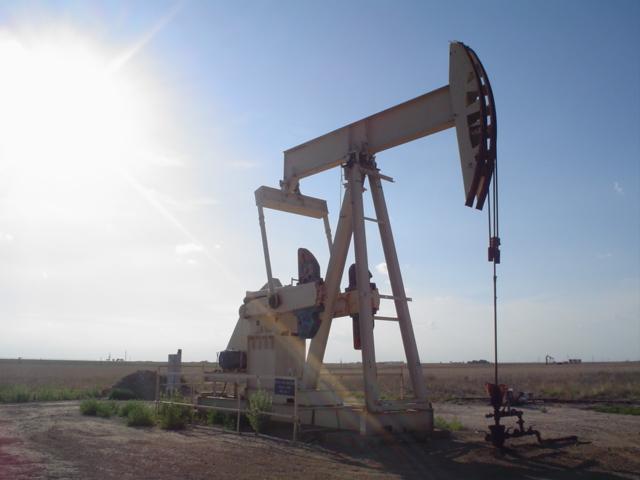At this month’s climate change conference, there’s a new tactic for reining in greenhouse gases
A pumpjack works to pull oil from the ground in Texas.
This year’s meetings of the UN's Framework Convention on Climate Change started Monday in Warsaw, Poland, with a new strategy for reducing greenhouse gas emissions on the table.
The aim is to link the climate treaties to pledges made in 2009 by the G20 group of nations to eliminate subsidies for fossil fuels.
The idea is pretty simple: if governments stop artificially making the price of oil, coal and natural gas cheap, people will use less when prices rise. And the money involved is huge.
A new report from the Overseas Development Institute in London pegs these subsidies worldwide each year at more than half a trillion dollars. The argument is there's little chance of reducing global warming emissions, unless fossil fuel subsidies are eliminated.
Joe Aldy, a former White House staffer who now teaches at Harvard’s Kennedy School, says these subsidies come in many forms. For example, when governments give credits or tax breaks for oil and gas extraction, that effectively lowers the cost of doing business for those companies.
In some cases, especially in developing countries, governments directly subsidize the price of gasoline, diesel, electricity and natural gas to lower the cost for consumers. But even these subsidies wind up helping the wealthy more than average consumers, argues Aldy.
"Countries that are large energy producers and large energy exporters are the biggest supporters of fossil fuels. So traditionally Iran headed the list. In 2008, they had fossil fuel subsidies of $100 billion," he said.
But Iran has reduced its sanctions dramatically recently, with sanctions hurting the economy and the country's ability to export oil.
According to reports, in some other countries, the spending on fossil fuel subsidies can rival or even exceed the amount that’s spent nationally on services like health care. There’s evidence, Aldy added, that these countries spend so much on keeping the price of fossil fuels low, they have fewer resources for public services, like education.
"In 2008, Indonesia spent $1 out of every $5 in its budget just to subsidize fossil fuels," Aldy said. "But even large countries in the developing world, like China and India, have subsidies that are on the order of $20-30 billion each year."
And the US also subsidizes fossil fuel production, with tax breaks for oil and gas producers effectively lowering the cost of investing in new wells, Aldy said. Even US coal producers receive some subsidies, but a proportionally small amount in actual dollars spent.
Aldy claimed there is a built-in subsidy for coal, too, since countries don't have energy companies pay the real costs of the pollution that coal burning creates.
"The fact that we don’t fully address the impacts of burning coal on lower air quality, the impacts on hospital admissions, as well as premature mortality, is an implicit subsidy for coal," Aldy argued.
Earlier this year, the International Monetary Fund tried to quantify those indirect costs. And while the US spends only a modest $4 billion on direct subsidies, if you factor in the indirect subsidies, the IMF found, US subsidies rise to $500 billion.
"When you start to account for the pollution consequences on health, the numbers get really, really big," Aldy said.
The G20 countries have committed to eliminating direct subsidies, but have no timetable for doing that. At the negotiations on the climate treaties, they’re talking about trying to implement a timetable to eliminate them by 2020.
"This will be tough. The United States tried to push for an explicit timetable for eliminating fossil fuel subsidies, and while there was consensus that this is a desirable objective, there was disagreement on what’s the appropriate timeframe," Aldy said.
Developing countries will need to eliminate subsidies, as well. They may see this as a drag on their development, but Aldy argued the policy could help them.
"There’s a variety of economic analysis that suggests eliminating these subsidies would help developing countries grow faster, but I think part of this gets to how we define subsidies," Aldy said.
Saudi Arabia, for example, spends about $60 billion in subsidies, according to some reports. But the Saudi government officially says it provides no subsidies. So even if countries agree to reductions, not everyone is working with the same set of facts.
"The challenge right now, I think, is to try to increase the information, increase the transparency, and add onto that accountability," said Aldy. Negotiating that, he said, like negotiating anything in the climate talks, will be tough.
We want to hear your feedback so we can keep improving our website, theworld.org. Please fill out this quick survey and let us know your thoughts (your answers will be anonymous). Thanks for your time!
